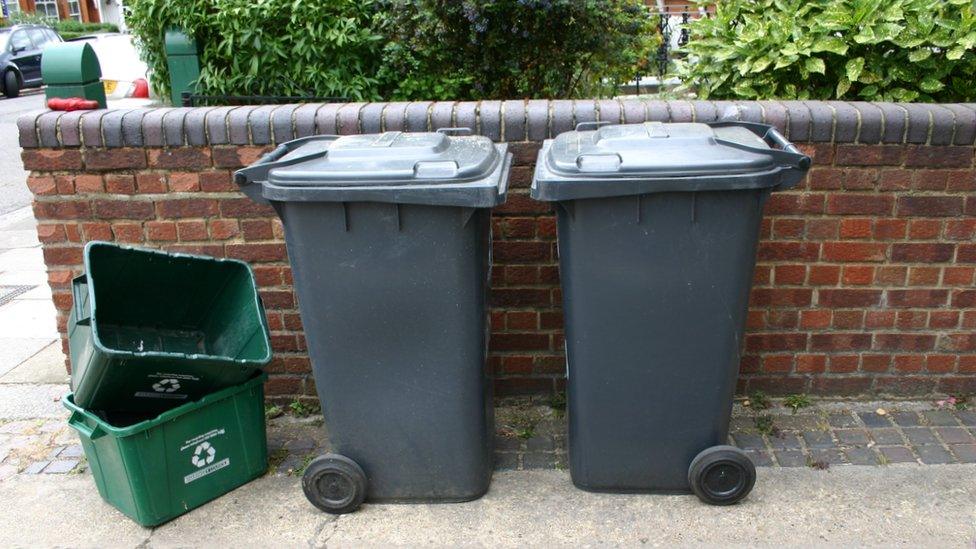Coronavirus: NI council votes to furlough 370 staff
- Published
- comments

Bin collections are among councils' responsibilities
Antrim and Newtownabbey Borough Council has voted to furlough about half of its workers following a special meeting on Thursday night.
More than 300 of the council's 650-strong workforce are set to be furloughed.
The plan includes full-time and casual employees,
Speaking after the meeting, Ulster Unionist Alderman Mark Cosgrove said that it was not possible to keep paying those staff wages.
"We are many, many millions in a cash deficit, but I think that we had to strike the balance between affordability and obviously ensuring that our colleagues who are being furloughed receive fair treatment," he said.
"But also the 140,000 customers - our residents - shareholders of Antrim and Newtownabbey Council also receive fair treatment."
With furlough providing 80% of a worker's wage, unions have called for the council to pay the extra 20%, meaning staff would not experience a drop in wages.
But the exact details of the deal struck have not been revealed, with councillors saying they want to tell staff first.
On Wednesday, a Stormont committee heard local councils were facing a "financial cliff edge".
Last month, ANBC deferred a decision to cut 46 of 73 jobs, following a backlash as it attempted to balance its budget.
Later, Communities Minister Deirdre Hargey confirmed councils could apply to put non-essential workers on the Coronavirus Job Retention Scheme.
The scheme allows employers to temporarily lay off staff while the government pays 80% of their wages during the crisis, and has been extended until October.
To date, the highest rate of council furloughing here is at Mid Ulster District Council, where the scheme is being used for almost 40% of its workforce.
'Losing £10.5m a month'
At the Stormont committee hearing on Wednesday, senior local government officials said some councils needed direct support to avoid becoming insolvent.

Belfast City Council is Northern Ireland's biggest, with 60 councillors
Councils are losing about £10.5m a month due to extra cost pressures, it is estimated.
All 11 councils will have to furlough some staff, said Suzanne Wylie, Belfast City Council's chief executive.
Although councils have continued to operate some essential services during the pandemic, they have had to place on hold many of their operations, including leisure and tourism.
'No other choice'
Ms Wylie told the Department for Communities committee those services were unlikely to resume until step five of the executive's recovery plan is implemented and there is no timeframe for that.
"Councils have been at the front line in this and it is important we avoid undermining critical services," she said.
"We don't have any other choice than to look to central government for help.
"We are asking that the lost income caused by the pandemic is mitigated by a specific Covid-19 support package, sustained throughout the crisis period."
David Jackson, chair of Solace NI, the body of chief executives who oversee Northern Ireland's councils, said there was a "tight timeframe" to get support to councils.
'Large-scale furloughing'

Senior Sinn Féin and Ulster Unionist politicians have said councils should retain as many members of their workforce as possible.
The committee also heard that while councils can avail of some emergency support from the Department for Communities, they are incurring new costs of about £1m a month to respond to the pandemic, such as providing protection equipment to staff.
"Some councils estimate that when this bites in the summer months - probably around August - in a world of no assistance, councils will either move into technical insolvency or will have to take quite severe measures to maintain most essential provision," warned Mr Jackson.
One council has suggested it would need to implement a rates hike of up to 30% in future, to "claw back" some of the income it had lost, he added.

EASY STEPS: How to keep safe
A SIMPLE GUIDE: What are the symptoms?
CONTAINMENT: What it means to self-isolate
HEALTH MYTHS: The fake advice you should ignore
MAPS AND CHARTS: Visual guide to the outbreak
VIDEO: The 20-second hand wash

- Published5 May 2020

- Published30 April 2020

- Published30 April 2019
